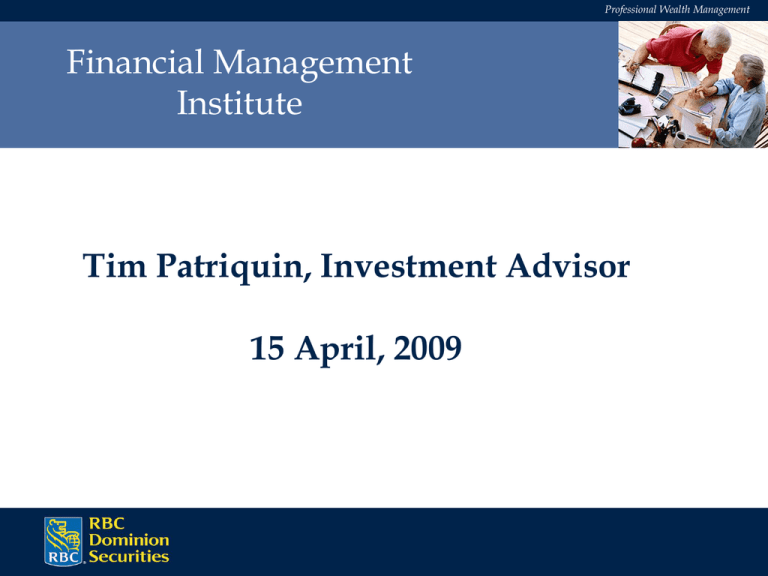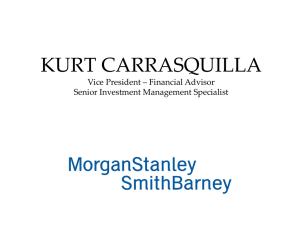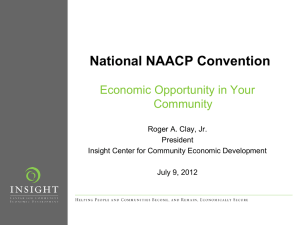
Professional Wealth Management
Financial Management
Institute
Tim Patriquin, Investment Advisor
15 April, 2009
Professional Wealth Management
AGENDA
Part I – Financial Planning 101
• How To Get Started
•
•
•
Financial Plan, Budgeting, Net Worth
Who Can Help?
Basics of Investing
Coffee Break
Part II – RSP Strategies and Retirement Planning
• Strategies (RSP and Non-Registered)
• Options at Retirement
• Insurance Products (Tax-efficient Investing)
RSP Strategies
Professional Wealth Management
How To Get Started
A Plan is a Must!
• Where Am I Now?
•
•
•
Net Worth (Assets – Liabilities)
Personal Budget
Where Do I Want to Go?
• Goals and Objectives
• Major Purchase, Children’s Education, Retirement, Marriage,
Vacation
• How Do I Get There?
•
•
RSP Strategies
Recommendations and Implementation
The Plan!
Professional Wealth Management
Personal Financial Plan
1. Data Gathering (Where Am I Now, Budget, Net Worth)
2. Set Goals and Objectives
3. Analysis / Find Solutions (i.e. Retirement Projection)
4. Recommendations
5. Implement Strategies
6. Follow-Up (At Least Annually)
RSP Strategies
Professional Wealth Management
Financial Planning
A financial plan is designed for your individual needs, whether you’re still working or
already retired, whether you’re single or married, or whether your financial situation is
less or more complex.
Your financial plan will help you address a wide range of financial concerns:
•
•
•
•
•
•
•
Cash management
Debt management
Tax planning
Investment planning
Retirement planning
Risk management
Estate planning
Your plan will contain specific recommendations which you need to implement to
achieve your financial goals.
RSP Strategies
Professional Wealth Management
Personal Budget
List all Income Items
•
•
Net income, spouse’s net income
Rental income, pension income, alimony, EI, public assistance, allowance
List all Expense Items
•
•
•
•
•
•
•
Home, utilities, food, family obligations (daycare, baby-sitting, child support, alimony)
Health and medical (insurance, fitness clubs, massages)
Transportation (car payments, gas, maintenance, insurance, license, tolls)
Debt payments (student loans, credit cards, lines of credit, other loans)
Entertainment / Recreation (cable, internet, movies, alcohol, hobbies, vacations)
Investments & Savings (RSP contributions, non-registered savings, emergency fund)
Miscellaneous (gifts, grooming, toiletries, pets, others)
Monthly Income minus Monthly Expenses = Surplus or Deficit
RSP Strategies
Professional Wealth Management
Surplus or Deficit?
How do I increase my monthly cash flow?
•
•
Increase your income; or
Decrease your expenses.
Decreasing Expenses
•
•
Eliminate Non-essential Expenses (cigarettes, alcohol, coffee, take your lunch)
Control Credit Card Debt (# 1 cause of financial problems in Canada)
•
•
•
RSP Strategies
One card is all you need (no fee, low interest)
Avoid low introductory rates (they revert to higher rates sooner or later)
Best investment you can make: pay off 19% credit card debt, you make 19%
return!
Professional Wealth Management
Who Can Help?
Who Can Help?
•
Your Local Bank (Mutual Fund Rep, Financial Planner, Bank Manager)
•
•
Discount Brokerage (On-line)
•
•
•
•
Best place when starting to invest
You do the research
You decide what to buy/sell and when to buy/sell
Lower fees
Full-Service Brokerage
•
•
RSP Strategies
Wealth Management
Quarterback
Professional Wealth Management
Wealth Management Services
Personal investment advice
Portfolio management
Financial plan
Saving for education
Retirement planning
Maximizing your retirement
income
Will and estate planning
Protecting your wealth
Charitable giving
Creating a legacy
RSP Strategies
Professional Wealth Management
The Full Range of Investment Solutions
Treasury Bills
Commercial paper
Guaranteed Investment Certificates
(GICs)
Government bonds
Corporate bonds
Strip coupons
Annuities
Mortgage-backed securities
Commodities
Income trusts
Real estate investment trusts
RSP Strategies
Royalty trusts
Preferred shares
Common stocks
World-class money
management programs
Mutual funds
Equity-linked notes
Options
Insurance
Segregated funds
Professional Wealth Management
Common Investment Solutions & Tax Treatment
Types of Investments
•
•
•
•
•
•
Cash or Cash Equivalents (T-Bills, GICs, Money Market Funds)
Fixed Income (Bonds, Government and Corporate)
Equities (Common Stock, Preferred Shares)
Mutual Funds (FE, DSC, LL, NL, F-class)
Segregated Funds (Principal protection)
Exchange Traded Funds (ETFs)
Tax Treatment
•
•
•
Interest income (T-Bills, GICs, Bonds)
Dividend Income (Common and Preferred Shares)
Capital Gains (Common and Preferred Shares, Bonds)
RSP Strategies
Professional Wealth Management
Types of Investment Accounts
Registered Retirement Savings Plan
•
Tax Deferred
Registered Education Savings Plan
•
Tax Deferred
Non-Registered Accounts
•
Taxable
Tax Free Savings Account
•
Tax Free
RSP Strategies
Professional Wealth Management
RSP Strategies
RSP Advantages
Save for retirement
Tax savings
Tax-deferred growth
Professional Wealth Management
RSP Advantages
Tax-deferred compounding
The power of tax-deferred growth
$10,000 invested within an RSP, then taxed at
the end of the time period vs. $5,000 invested
outside an RSP, growing at 8% annually. A
50% marginal tax rate is assumed.
$50,313
Outside RSP
Inside RSP
$23,305
$10,795
$7,401
10 YEARS
RSP Strategies
$16,217
$10,956
20 YEARS
30 YEARS
Professional Wealth Management
The Power of Compounding
Here is an interesting example:
A person saves $200 per month and, over the course of time, earns a
hypothetical annual rate of return of 8.00%.
Using this example, the person starts saving money at age 25. By the time she
is age 70, she would have accumulated $1,054,908. Had the same person
started saving money at age 35, she would have accumulated $458,776, by age
70. The difference of a mere 10 years would be $596,132. The natural power
of compounding is incredible.
Did you know that legend has it that Albert Einstein said that compounding
was the world's greatest invention?
RSP Strategies
Professional Wealth Management
The Right Asset Mix
Asset mix is the balance
between stocks, bonds
and cash
Your asset mix largely
determines returns and
risk level
Generally, stocks provide
greater growth over the
long term, but greater
volatility than cash or
bonds
Most important
investment decision you
will make
RSP Strategies
Professional Wealth Management
The Right Asset Mix
Your ideal asset mix largely depends on your life stage
Life Stage 1
Life Stage 2
Life Stage 3
Building Your RSP
Managing Your RSP
Enjoying Your Success
Stocks
65%
RSP Strategies
Cash
0%
Bonds
35%
Stocks
50%
Cash
5%
Bonds
45%
Stocks
25%
Cash
10%
Bonds
65%
Professional Wealth Management
Eligible Investments
Most types of
investments are RSPeligible
Liquid investments, fixed
income, equity, mutual
funds
Elimination of foreign
content limit – greater
diversification
RSP Strategies
Professional Wealth Management
How to Use Tax Refunds
Top up your RSP
Make your current year’s RSP
contribution
Add to non-registered savings
Pay debt
Reduce mortgage balance
Make a charitable donation
Tax Free Savings Account
Treat Yourself
RSP Strategies
Professional Wealth Management
Making Contributions
Contributions
based on earned
income
Pension
adjustment
Carry forward
RSP Strategies
Professional Wealth Management
Consolidation Benefits
Understand your financial “big picture”
Easier to keep track of asset mix
Reduced administrative costs
Consolidated tax reporting
Understand your
financial “big
picture”
Easier to keep track
of asset mix
Reduced
administrative costs
RSP Strategies
Professional Wealth Management
Maximize your Foreign Content
No foreign content limit
Reduced risk through diversification
Greater return potential
More opportunity
RSP Strategies
Professional Wealth Management
Maximize your Foreign Content
The optimum balance of foreign content
(S&P 500 vs. S&P TSX)
December 31 1996 - December 31, 2006
Annualized Rate of Return
9.00%
100% S&P TSX
8.00%
7.00%
6.00%
5.00%
100% S&P 500
4.00%
10.00%
11.00%
12.00%
13.00%
14.00%
15.00%
Risk - Annualized Standard Deviation
Source: FactSet
RSP Strategies
16.00%
17.00%
Professional Wealth Management
Spousal RSPs
Legitimate form of income splitting
Couples can benefit from a spousal RSP
Tax savings today
Lower income tax tomorrow
Attribution rules
RSP Strategies
Professional Wealth Management
Options at Retirement
Retirement
•
•
What Does It Look Like?
Longer Life Spans = Longer Retirements
Options
•
•
•
•
•
Pension
RSP
Non-registered Options (T-SWP, RetirementEdge)
Tax Free Savings Accounts (New for 2009)
Insurance (Sunwise Elite Plus, Manulife Income Plus)
RSP Strategies
Professional Wealth Management
Sources of Information
www.globefund.ca
www.morningstar.ca
www.canadianbusiness.com
www.canadianbusiness.com/moneysense_magazine
The Wealthy Barber
RSP Strategies
Professional Wealth Management
Tim’s Contact Information
Direct Office Line: 416-842-2468
Email: tim.patriquin@rbc.com
Website: www.timpatriquin.com
RSP Strategies
Professional Wealth Management
Thank You
you
Any questions?
RSP Strategies
RBC Dominion Securities Inc.* and Royal Bank of Canada are separate corporate entities which are affiliated. *Member CIPF. Insurance products
are offered through RBC DS Financial Services Inc., an insurance subsidiary of RBC Dominion Securities Inc. When discussing and selling life
insurance products, Investment Advisors are acting as Insurance Representatives of RBC DS Financial Services Inc. RBC DS Financial Services Inc.
is licensed as a financial services firm in the province of Quebec. ® Registered Trademark of Royal Bank of Canada. Used under licence.
©Copyright 2007. All rights reserved.












